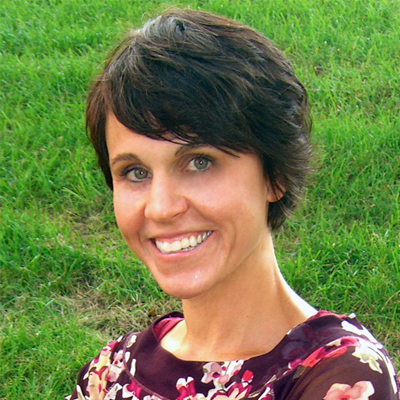Exploring alternative agricultural techniques for sustainable ecological systems
Our growing population faces increasing challenges to maintain a stable supply of healthy, nutritious food. With the greater frequency of extreme weather, including hotter temperatures, longer periods of drought, and more incidence of flooding, the need to create agricultural systems that provide sustainable and resilient solutions designed to best meet our food production needs has never been greater. As an ecological management system, organic agriculture strives to produce food in a way that sustains the environment and people; both the consumers of food and farmers, the stewards of the land. While organic agriculture has many demonstrated benefits in sustainability—environmental, social, and economic—it is a complex management system for which research efforts have largely been ignored, prior to the last decade. Dr. Erin Silva, Assistant Professor at University of Wisconsin-Madison, is one of the few U.S. researchers solely devoted to researching and understanding organic agricultural and ecological systems. Her research optimizes practices that allow farmers to successfully produce organic crops, while enhancing the environmental benefits that organic agriculture provides.
Dr. Silva’s agroecological research on organic crops include grains, vegetables, and pastures. She works broadly across management systems in organic agriculture to create a long-term alternative way to meet our growing food production needs in the U.S. and globally, while creating a healthy environment. Her research focuses on producing food in a more ecological manner by using a variety of techniques that promote a resilient and healthy organic system. These include helping farmers grow diverse crops using systems-based management approaches, including the fostering of soil nutrients, encouraging beneficial insect predators, and using crop varieties that inherently resist disease and insect pests, thus creating an organic system that is healthy and sustainable to both the people to which the food is going, and to farmers and their families.
Dr. Silva and her team of technicians, scientists, and graduate students collaborate with researchers across the U.S., with disciplines in agronomy, horticulture, soil science, entomology, plant pathology, agricultural economics, and community and environmental sociology. They use a participatory model with farmers to ensure real-world applicability and facilitate adoption of their organic agriculture techniques.
Current research includes:
- Improving Soil Quality and Health Using No-till Techniques - Organic farmers must use holistic ecological approaches to manage pest and weed problems without using chemical herbicides. They typically manage invasive weeds through mechanical cultivation, using tractor-based implements. However, using larger equipment put soils at risk for erosion and compaction. For the past eight years, Dr. Silva and her team have explored and developed alternative methods to manage weeds in the organic agriculture system. They are implementing a no-till technique that uses a tool to cover crops so farmers can build and maintain high-quality soil, ensuring weeds don’t become problematic and overtake their crops. They are working to refine this agro-ecological system and widely apply and translate their research across the landscape. Their goal is to ensure this technology reaches its potential and maximizes its impact on organic farms.
- Observing and Improving Pastures for Dairy Herds - Pasture plays an important role in resilient agricultural systems globally, as it aids in maintaining our soil and water resources and quality. However, certain lands are not suited for intensive production. Dr. Silva and her team look at how to best manage pasture resources in organic production systems, ensuring they’re high-quality, resilient, and sustainable. As is required by the US organic regulation, cows that feed on grass produce milk with higher levels of health-promoting fatty acid profiles, which improve the quality of animal products and further serve to enhance our environmental resources. Dr. Silva’s team observe diverse types of grasses and clovers that grow well on pastures—looking at how they relate to productivity and resilience—and identify the varieties that perform well in organic systems. This environmentally and economically beneficial method of feeding livestock offers incredible value in ecosystem services, as her team identifies overall management factors that will allow farmers to create a system that is productive in both the short and long term.
- Identifying and Developing Vegetable Varieties - Many organic food consumers are interested in eating high-quality, good-tasting, and nutritious crops. Often, the typical produce sold in stores lack the incredible burst of flavor people desire when eating fruits and vegetables. Dr. Silva works with plant breeders to identify the adaptation and development of new vegetable cultivars that meet both consumer expectations and improve the overall management system of organic farming. She and her team are researching organic farming methods that allow farmers to create an environmentally-friendly and resilient system that doesn’t require outside inputs, such as fertilizers and pesticides. They aim to create, develop, and identify high-quality vegetable crops that produce delicious and healthy vegetables, while maintaining the traditional growth traits in vegetables developed for conventional and industrialized systems. Dr. Silva and her team look for vegetable varieties that both fit-in and augment the current management system. They look at growth traits that allow vegetables to naturally be more resistant to pest and weed pressures, while maximizing the soil characteristics in present in organic systems.
Bio
The pursuit of solving problems has excited Dr. Erin Silva since her early school years. She has always wanted to be an academic, with a fondness of continually learning and seeking out new information. She became interested in environmental research in high school, after reading a book about the life of Dian Fossey. As an undergraduate at University of Wisconsin studying biology, with a minor in chemistry, Dr. Silva soon realized that wildlife biology was not where her heart was. This realization occurred after she took her first plant biology class. She was fascinated with the complexity of plants, and hadn't given much thought to the sessile organisms present throughout our environment. After receiving an opportunity to work in the lab of a scientist for the USDA Agricultural Research Service, she wanted to pursue agricultural research. It strongly aligned passion of environmental and land stewardship, and well as the contribution it makes to global health and food security.
Dr. Silva’s interest and involvement in organic agriculture increased after she observed high-input systems—those that heavily use chemicals, pesticides, and soil-disrupting technology—in New Mexico and looked at how intensive the land production was. When she understood the important implications of using a sustainable system as an alternative paradigm for agriculture, it deeply resonated with her. Her passion for organic agriculture continues with the knowledge that producing food in a sustainable and healthy system will improve society overall. In her free time, Dr. Silva enjoys running, hiking, and spending time with her family, which includes her three children.


